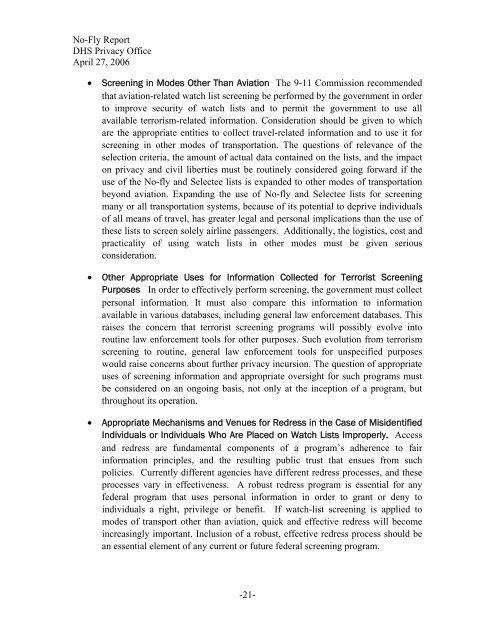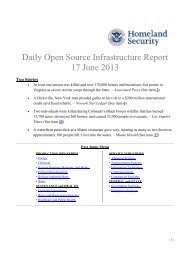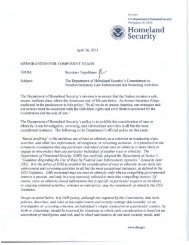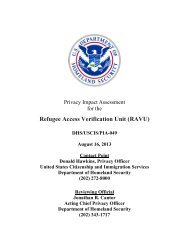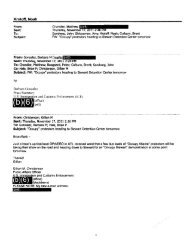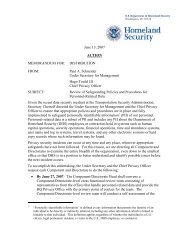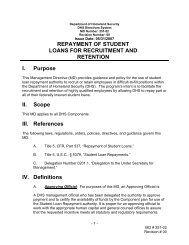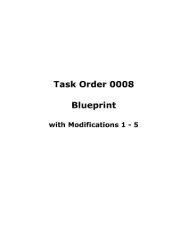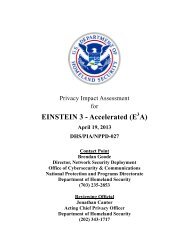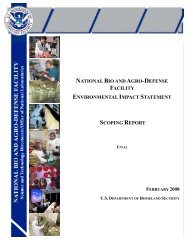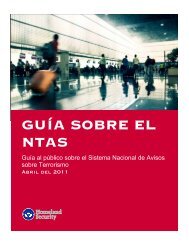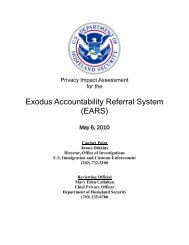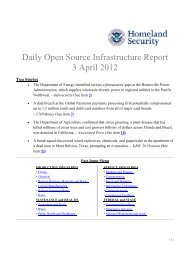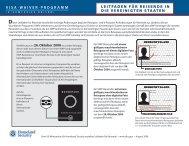Report: No Fly - Homeland Security
Report: No Fly - Homeland Security
Report: No Fly - Homeland Security
Create successful ePaper yourself
Turn your PDF publications into a flip-book with our unique Google optimized e-Paper software.
<strong>No</strong>-<strong>Fly</strong> <strong>Report</strong><br />
DHS Privacy Office<br />
April 27, 2006<br />
• Screening in Modes Other Than Aviation The 9-11 Commission recommended<br />
that aviation-related watch list screening be performed by the government in order<br />
to improve security of watch lists and to permit the government to use all<br />
available terrorism-related information. Consideration should be given to which<br />
are the appropriate entities to collect travel-related information and to use it for<br />
screening in other modes of transportation. The questions of relevance of the<br />
selection criteria, the amount of actual data contained on the lists, and the impact<br />
on privacy and civil liberties must be routinely considered going forward if the<br />
use of the <strong>No</strong>-fly and Selectee lists is expanded to other modes of transportation<br />
beyond aviation. Expanding the use of <strong>No</strong>-fly and Selectee lists for screening<br />
many or all transportation systems, because of its potential to deprive individuals<br />
of all means of travel, has greater legal and personal implications than the use of<br />
these lists to screen solely airline passengers. Additionally, the logistics, cost and<br />
practicality of using watch lists in other modes must be given serious<br />
consideration.<br />
• Other Appropriate Uses for Information Collected for Terrorist Screening<br />
Purposes In order to effectively perform screening, the government must collect<br />
personal information. It must also compare this information to information<br />
available in various databases, including general law enforcement databases. This<br />
raises the concern that terrorist screening programs will possibly evolve into<br />
routine law enforcement tools for other purposes. Such evolution from terrorism<br />
screening to routine, general law enforcement tools for unspecified purposes<br />
would raise concerns about further privacy incursion. The question of appropriate<br />
uses of screening information and appropriate oversight for such programs must<br />
be considered on an ongoing basis, not only at the inception of a program, but<br />
throughout its operation.<br />
• Appropriate Mechanisms and Venues for Redress in the Case of Misidentified<br />
Individuals or Individuals Who Are Placed on Watch Lists Improperly. Access<br />
and redress are fundamental components of a program’s adherence to fair<br />
information principles, and the resulting public trust that ensues from such<br />
policies. Currently different agencies have different redress processes, and these<br />
processes vary in effectiveness. A robust redress program is essential for any<br />
federal program that uses personal information in order to grant or deny to<br />
individuals a right, privilege or benefit. If watch-list screening is applied to<br />
modes of transport other than aviation, quick and effective redress will become<br />
increasingly important. Inclusion of a robust, effective redress process should be<br />
an essential element of any current or future federal screening program.<br />
-21-


